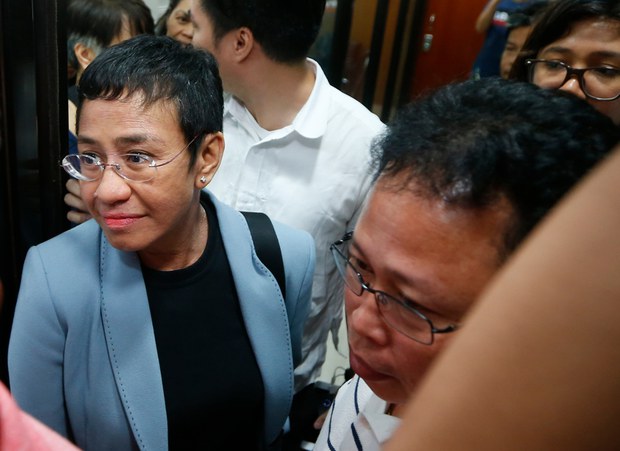Philippine Authorities Arrest Head of Rappler News Website
2019.02.13
Manila and Bacolod, Philippines
 Maria Ressa, the head of a Philippine online news site Rappler, which has aggressively covered President Rodrigo Duterte’s policies, is escorted into another room following her arrest by National Bureau of Investigation agents in a libel case, in Manila, Feb. 13, 2019.
Maria Ressa, the head of a Philippine online news site Rappler, which has aggressively covered President Rodrigo Duterte’s policies, is escorted into another room following her arrest by National Bureau of Investigation agents in a libel case, in Manila, Feb. 13, 2019.
Free press advocates accused the Philippine government Wednesday of being out to intimidate journalists after authorities arrested the chief of the Rappler news website, which has reported critically on President Rodrigo Duterte’s brutal drug war, on suspicion of cyber libel.
Rappler issued a statement following the arrest of CEO and Executive Editor Maria Ressa by the National Bureau of Investigation (NBI) earlier in the day. The award-winning journalist’s arrest was filmed and broadcast live by Rappler.
Ressa was taken into custody in connection with a cyber libel case filed by the justice department, and a day after the Manila Regional Trial Court Branch 46 issued a warrant for her arrest. At least one of the arresting officers tried to stop a Rappler employee from videotaping the incident at the news site’s offices in Manila over her mobile phone, Rappler said.
In a brief statement, Ressa said she had not seen the indictment before the court issued the warrant.
“It is a shock. But we are going,” Ressa said. “I will do the right thing. I will keep going.”
The move was an attempt by the Duterte administration to persecute Ressa, with the ultimate aim of shutting down the news website for its coverage of the president’s drug war that has killed thousands of Filipinos since Duterte took office in mid-2016, said Carlos Conde, a Philippine researcher for New York-based Human Rights Watch.
The National Union of Journalists of the Philippines (NUJP) criticized Ressa’s arrest as a “shameless act of persecution by a bully government.”
“It is clear that the Department of Justice perverted the law by charging Maria for an offense allegedly committed before it actually became an offense under the law,” the group said, referring to the 2012 Cybercrime Prevention Act that criminalizes libel committed over the internet.
“This government, led by a man who has proven averse to criticism and dissent, now proves it will go to ridiculous lengths to forcibly silence a critical media and stifle free expression and thought,” the NUJP said.
Butch Olano, the Philippine director of global rights watchdog Amnesty International, said the arrest of Ressa was “brazenly motivated.” He called on the government to stop its harassment of legitimate media and repeal what it called a repressive law.
“In a country where justice takes years to obtain, we see that charges against Maria Ressa railroaded, and the law being used to relentlessly intimidate and harass journalists for doing their jobs as truth tellers,” Olano said.
On Wednesday, neither the National Bureau of Investigation nor the Philippine Department of Justice issued statements about Ressa’s arrest.
Complaint over 2012 story
The cyber libel case stemmed from a story published by Rappler in May 2012. The complaint was brought by Wilfredo D. Keng, a businessman who was identified in the article as the owner of a sports utility vehicle that then-Chief Justice Renato Corona had used during his impeachment trial.
In 2012, the Senate, acting as an impeachment court, found Corona guilty of violating a rule about disclosing his real assets and net worth. The impeachment tarnished his otherwise good judicial record, and Corona died of natural causes four years later.
Keng complained that the report, which cited a background check on him, painted him as having alleged links to illegal drugs and human trafficking. Rappler had based its article on intelligence reports.
The arrest of Ressa was the latest case against Rappler, one of few news entities in the Philippines that have actively been reporting on the government’s much-maligned drug war.
Last year, Ressa, a former CNN bureau chief in Manila and Jakarta, posted bail of up 60,000 pesos (U.S. $1,154) after a local court issued an arrest warrant against her.
The warrant stemmed from the government’s accusation that Rappler had violated the country’s tax code, by allegedly misrepresenting its tax returns when it issued Philippine Depository Receipts (PDR) for some of its former U.S.-based investors.
But Rappler’s American investors subsequently let go of their PDRs. The case would have ended there, but the government alleged that she failed to properly pay taxes on the sale or transfer of the PDRs.
“It is clear this is part of the administration's obsession to shut Rappler down and intimidate the rest of the independent Philippine media into toeing the lines,” the NUJP said.
The union also called on all freedom-loving Filipinos to stand with the independent press, arguing that the government was also trampling on the public’s right now in its actions against Rappler.
Jeoffrey Maitem contributed to this report from Cotabato, Philippines.







